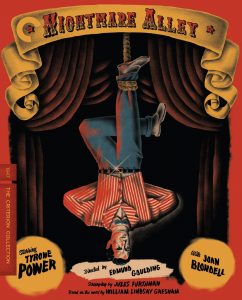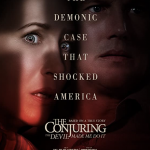
Criminally overlooked and unavailable for years, Edmund Goulding’s Nightmare Alley is finally getting a proper home video release. Unceremoniously dumped into theaters by 20th Century-Fox in 1947, the film has achieved a cult status over the years, championed by those who saw it during its original release, via one of its rare television airings or after its belated DVD release in 2005. Its fans are passionate about the movie and it’s easy to see why – it’s a brilliant example of film noir, it continues to surprise after repeated viewings and it contains Tyrone Power’s greatest performance.
Based on the best-selling novel by William Lindsay Graham, the story’s setting is that of a traveling carnival, a world the author knew well thanks to his spending some of his younger years with such a troupe. Goulding captures the seedy nature of the environment for the start, what with the set sporting a rundown look, the casts’ wardrobe looking as if it had gone through the wash one too many times and a slightly haggard look nearly all of them sport.
However Stanton Carlisle (Power) is the exception. A perpetual gleam in his eye, he’s always on the make, constantly looking for a way to make a buck, his conscience a liability he got rid of long ago. He stumbles upon a surefire way to leave this two-bit life behind and make it to the big time when his sideshow partner Zeena (Joan Blondell) tells him about a system she once used to fool audiences into thinking she was a legitimate mind-reader. Reluctant to part with this code, she finally relents and before the dust can settle he’s shaken from his shows, Stanton and Molly (Coleen Gray) head to Chicago. Sure enough, they do make it big, playing in high-class nightclubs, wowing the unsuspecting by revealing intimate details about them they couldn’t possibly know. It’s all a sham yet the city is taken in by the act, that is everyone except Lilith Ritter (Helen Walker), a psychologist who not only sees right through Stanton, recognizing him as a kindred soul she can use for her own personal gain.
The twists and turns that occur from there are better off not revealed, one of the most entertaining elements about the movie being the surprises it contains, all of them adhering to the film’s interior logic. The screenplay by Jules Furthman for the most part stays true to the spirit of its source, so some changes were necessary. A lurid passage is cleaned up here and there, while elements about Stanton’s background are excised. These are excusable though the studio-imposed ending is disastrous, an attempt at a semi-feel good conclusion not in keeping with the story or genre conventions.
Be that as it may, Power is captivating throughout. An actor that never got his due, he hounded studio chief Daryl Zannick to purchase the rights to Graham’s novel so that he might prove he could do more than simplistic adventure films. He takes the opportunity and runs with it, his eyes and hands constantly moving, a barely contained sense of disdain for everyone he meets. Everyone is a mark to be taken or a tool to be used and Power conveys this with his sly line readings and formal bearing. You can’t take your eyes off him and you realize so much of his potential was wasted in studio programers and can’t help but wonder what he might have been capable of had been allowed to mature as an actor, his career cut tragically short with his death at the age of 44.
One of the film’s biggest fans, Oscar-winning director Guillermo Del Toro has remade Nightmare Alley which is set for a December 2021 release. As such, the timing of Criterion’s release of Goulding’s original couldn’t be better, an overlooked gem ripe for rediscovery that reminds us as all effective noirs do that there is no escaping our fate, no matter how far we run or the number of disguises we employ.



